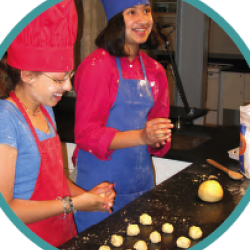Source Institutions
Source Institutions
Add to list Go to activity
Activity link broken? See if it's at the internet archive

This is an activity (on page 2 of the PDF under Surface Area Activity) about surface area to volume ratio. Learners will bake sugar cookies, testing how much colored sugar is rolled up by 1 large ball of dough vs. an equal amount of dough divided into 20-25 small balls. Surface area to volume ratio is an important concept in nanotechnology because it helps explain why the same substance can behave differently when broken into nanosized pieces. Also relates to linked video, DragonflyTV Nano: Surface Area.
- 5 to 10 minutes
- 30 to 45 minutes
- $10 - $20 per group of students
- Ages 8 - 14
- Activity, Lesson/Lesson Plan, Simulation
- English
Quick Guide
Materials List (per group of students)
- sugar cookie dough
- 1 tablespoon red sugar (or color of your choosing)
- 1 tablespoon green sugar (or color of your choosing)
- wax paper
- measuring spoons
- oven
- cookie sheets
Subjects
-
Engineering and Technology
-
Engineering
- Nanotechnology
-
Engineering
-
Mathematics
-
Measurement
- Size and Scale
-
Number and Operations
- Fractions
- Multiples and Factors
- Representation
-
Measurement
-
Physical Sciences
-
Structure and Properties of Matter
- Volume and Density
-
Structure and Properties of Matter
-
The Nature of Science
-
The Scientific Process
- Conducting Investigations
- Formulating Explanations
-
The Scientific Process
Informal Categories
- Food and Cooking
Audience
To use this activity, learners need to:
- see
- see color
- taste
- touch
Learning styles supported:
- Involves hands-on or lab activities
Other
Components that are part of this resource:
Includes alignment to state and/or national standards:
This resource is part of:
Access Rights:
- Free access
By:
Source Collection
- DragonflyTV
Rights:
- All rights reserved, Twin Cities Public Television, Inc., 2008
Funding Source:
- National Science Foundation, 741749
